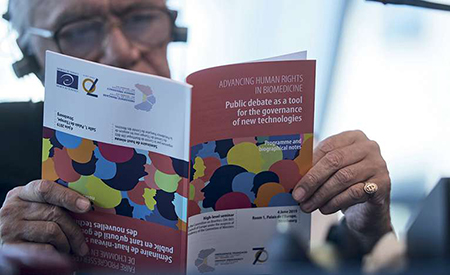European Directorate for the Quality of Medicines and Healthcare (EDQM)
The EDQM’s mission is to protect public health by enabling the development and supporting the implementation of quality standards for safe medicines and their safe use, as well as other health products such as substances of human origin, cosmetics and food contact materials. The standards set by the EDQM are recognised scientific benchmarks and are applied in Europe and beyond.
The EDQM’s work covers a wide range of areas, each requiring specific expertise and scientific know-how. It is responsible for: establishing the official quality standards of the European Pharmacopoeia, which prescribe how human and veterinary medicines and substances used in their manufacture should be tested and quality controlled; granting Certificates of Suitability to manufacturers after they have demonstrated that the substance they produce can be adequately controlled by the quality standards defined in the European Pharmacopoeia; co-ordinating a network of Official Medicines Control Laboratories to ensure effective, independent quality control of medicines in Europe; providing policies and model approaches for the safe use of medicines, including guidelines on pharmaceutical care; drafting ethical, safety and quality standards for blood transfusion and organ, tissue and cell transplantation; working with national, European and international organisations to protect public health from the dangers of falsified medical products; establishing standards for cosmetics and food contact materials, and co-ordinating a network of Official Cosmetic Control Laboratories to ensure and monitor the quality of cosmetics on sale in Europe.
International non-governmental organisations (INGOs) may contribute to the elaboration and maintenance of the European Pharmacopoeia’s standards by attaining observer status to the European Pharmacopoeia Commission, in line with the Commission’s Rules of Procedure. Furthermore, representatives of the Conference of INGOs of the Council of Europe may participate in the work of various intergovernmental committees on healthcare issues, contributing to discussions on pharmaceuticals, blood transfusion, organ transplantation and other public health matters. In addition to these formal roles, civil society can participate in public consultations, providing feedback on draft documents. The EDQM also encourages engagement of civil society through various events.
To become involved and stay informed about upcoming opportunities, civil society representatives are encouraged to visit the EDQM website, where information about the EDQM’s activities, pending consultations and forthcoming events is available.

Scientific and technological developments are a source of important potential advances for biomedicine and health. However, some of these developments, the way they are applied and the evolution of practices could give rise to infringements of fundamental rights.
The Convention on Human Rights and Biomedicine is the only international legally binding text which specifically addresses human rights protection in the biomedical field, including healthcare. Its principles are further developed in additional protocols focusing on specific issues.
Work focuses on developing legal texts to reinforce existing laws and on producing tools and other material to help implement binding legal principles, following developments emanating from decisions and judgments of the European Court of Human Rights. The Council of Europe maintains partnerships with other intergovernmental organisations working on the issue, such as WHO, OECD, UNESCO and with civil society.
Steering Committee for Human Rights in the fields of Biomedicine and Health – CDBIO
The CDBIO carries out work on the applications of biology and medicine covered by the Convention on Human Rights and Biomedicine; conducts intergovernmental work on human rights protection in the fields of biomedicine and health; especially issues raised by the Covid-19 pandemic, taking into account lessons learned from the health crisis; advises and provides expertise to the Committee of Ministers.
Focus 2022-2025
Promoting autonomy in mental healthcare; equitable access to (i) medical treatment and equipment in situations of scarce resources, (ii) appropriate innovative treatments and technologies in healthcare; health literacy – contributing to trust building and equitable access to healthcare; protection and promotion of patients’ rights, participation of children in decision making processes on matters relating to their health; artificial intelligence in healthcare; promotion of public dialogue on genomic medicine; genome editing; youth forum on bioethics.
Civil society involvement
- Participant: Conference of INGOs (CINGO)
- Observers
- Consultation with civil society, either through direct participation in meetings, or through dedicated hearings or written consultations



